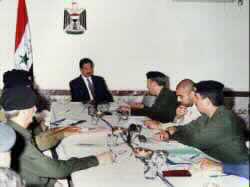President Saddam Hussein said on Monday Iraq would consider cooperating with a U.N. resolution on arms inspections if it was not just a pretext for a U.S. attack. At the United Nations, after weeks of wrangling, signs emerged that a compromise resolution may be agreed this week. "If a resolution is issued which respects the U.N. charter, international law and Iraq's sovereignty, security and independence, and does not provide a cover for America's ill intentions, we will view it in a way that makes us deal with it," official Iraqi television quoted Saddam as telling visiting far-right Austrian politician Joerg Haider.
The comment appeared to mark a shift in Baghdad's stance. Its officials have repeatedly insisted there is no need for a new resolution governing inspections of its alleged programs to develop nuclear, biological or chemical weapons.
But diplomats noted the reference to respecting Iraq's "sovereignty, security and independence," saying in the past this meant restrictions on where U.N. arms inspectors can go.
The United States has made several changes in the last week to a tough resolution intended to give unfettered access to the inspectors.
Washington was now offering to wait until chief U.N. weapons inspector Hans Blix reported any major problems and then discuss them with the council before determining a "further material breach" or launching any military strike.
But the United States still opposed allowing the council to authorize the use of force or to determine what would constitute a "further material breach" of U.N. resolutions.
VOTE EXPECTED FRIDAY
Diplomats say because of differences among the five veto-holding permanent members of the Security Council -- the United States, Britain, Russia, China and France -- the revised resolution was not expected to be presented until late Tuesday or Wednesday.
The United States and Britain hope for a vote by Friday.
Prime Minister Tony Blair of Britain, the most steadfast of Washington's military allies, said Monday the five permanent members were converging on agreement.
Secretary of State Colin Powell, national security adviser Condoleezza Rice, Defense Secretary Donald Rumsfeld and other officials were meeting in Washington to decide on the modifications, administration officials said.
MILITARY PREPARATIONS
Although the White House insists President Bush has not decided on war against Iraq, the U.S. has been building up its forces and equipment in the Gulf region.
A number of U.S. aircraft carriers are within striking distance of Iraq and a U.S. Navy official said three huge U.S. military cargo vessels capable of carrying tanks left U.S. shores in recent days. The official did not disclose where they were headed.
The ships are among the largest transport ships in the U.S. military's inventory. Two have seven decks capable of carrying tanks, helicopters and other heavy armor.
In Iraq, there were few signs of a military buildup, troop movements or anti-aircraft activity, but there was evidence the government is girding itself for attack.
Saddam has ordered double food rations to be provided for the population for two months in the event of war, his trade minister announced. Fuel dumps were being restocked and air-raid warning sirens tested.
PHOTO CAPTION
Iraqi President Saddam Hussein, center, meets his top officials in Bahgdad Sunday, Nov 3. 2002. On the left side nearest to Saddam , barely visible is his younger son Qussai Hussein, commander of the elite Republican Guard , second left, is head of the Iraqi nuclear organization Fadhil Al-Jenabi, third right is Deputy Prime Minister Abdel Tawab Mullah Huweish, Saddam's older son Odai Hussein, commander of the Saddam Commandos, is second right and Meisar Rija Shilah, Minister of Industry right. (AP Photo/INA, HO)
- Author:
& News Agencies - Section:
WORLD HEADLINES


 Home
Home Discover Islam
Discover Islam Quran Recitations
Quran Recitations Lectures
Lectures
 Fatwa
Fatwa Articles
Articles Fiqh
Fiqh E-Books
E-Books Boys & Girls
Boys & Girls  Women
Women










